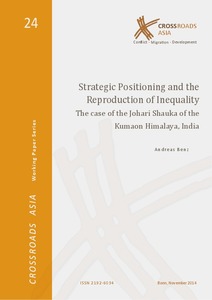Benz, Andreas: Strategic Positioning and the Reproduction of Inequality : The case of the Johari Shauka of the Kumaon Himalaya, India. Bonn: Competence Network Crossroads Asia: Conflict – Migration – Development, 2014. In: Baldauf, Ingeborg; Conermann, Stephan; Kreutzmann, Hermann; Nadjmabadi, Shahnaz; Reetz, Dietrich; Schetter, Conrad; Sökefeld, Martin; Hornidge, Anna-Katharina (Hrsg.): Crossroads Asia Working Paper Series, 24.
Online-Ausgabe in bonndoc: https://hdl.handle.net/20.500.11811/157
Online-Ausgabe in bonndoc: https://hdl.handle.net/20.500.11811/157
@techreport{handle:20.500.11811/157,
author = {{Andreas Benz}},
editor = {{Ingeborg Baldauf} and {Stephan Conermann} and {Hermann Kreutzmann} and {Shahnaz Nadjmabadi} and {Dietrich Reetz} and {Conrad Schetter} and {Martin Sökefeld} and {Anna-Katharina Hornidge}},
title = {Strategic Positioning and the Reproduction of Inequality : The case of the Johari Shauka of the Kumaon Himalaya, India},
publisher = {Competence Network Crossroads Asia: Conflict – Migration – Development},
year = 2014,
month = nov,
series = {Crossroads Asia Working Paper Series},
volume = 24,
note = {This paper is concerned with socio-economic inequalities and their (re-)production, empirically inquired for the particular case of the upper Gori valley in the Kumaon Himalaya of India. The strand of so-called reproduction theories of critical sociology offers a well-established theoretical basis and starting point for such an analysis of inequalities and their development over time . These theories consider current socio-economic positions and inequalities as largely dependent on preceding, former inequalities. They interpret the current status quo of disparities as being the most recent stage of a path-dependent trajectory, along which inequalities have developed and been (re-)produced over time. The case of the Johari Shaukas shows how strategic positionality has been used by this group to obtain and secure preferential access to resources (e.g. trade income, education, government sector employment and political power positions) by strategic positioning and identity policy in changing contexts. Through these flexible re-positionings, the Johari Shauka could defend and reproduce their socio-economic position. Thus strategic positionality has been used as just another tool of social reproduction.},
url = {https://hdl.handle.net/20.500.11811/157}
}
author = {{Andreas Benz}},
editor = {{Ingeborg Baldauf} and {Stephan Conermann} and {Hermann Kreutzmann} and {Shahnaz Nadjmabadi} and {Dietrich Reetz} and {Conrad Schetter} and {Martin Sökefeld} and {Anna-Katharina Hornidge}},
title = {Strategic Positioning and the Reproduction of Inequality : The case of the Johari Shauka of the Kumaon Himalaya, India},
publisher = {Competence Network Crossroads Asia: Conflict – Migration – Development},
year = 2014,
month = nov,
series = {Crossroads Asia Working Paper Series},
volume = 24,
note = {This paper is concerned with socio-economic inequalities and their (re-)production, empirically inquired for the particular case of the upper Gori valley in the Kumaon Himalaya of India. The strand of so-called reproduction theories of critical sociology offers a well-established theoretical basis and starting point for such an analysis of inequalities and their development over time . These theories consider current socio-economic positions and inequalities as largely dependent on preceding, former inequalities. They interpret the current status quo of disparities as being the most recent stage of a path-dependent trajectory, along which inequalities have developed and been (re-)produced over time. The case of the Johari Shaukas shows how strategic positionality has been used by this group to obtain and secure preferential access to resources (e.g. trade income, education, government sector employment and political power positions) by strategic positioning and identity policy in changing contexts. Through these flexible re-positionings, the Johari Shauka could defend and reproduce their socio-economic position. Thus strategic positionality has been used as just another tool of social reproduction.},
url = {https://hdl.handle.net/20.500.11811/157}
}






